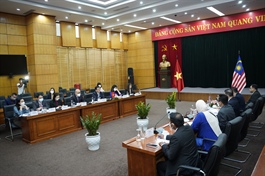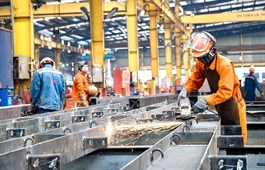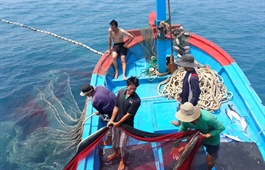Localities still itch for new casinos despite losses
Localities still itch for new casinos despite losses
Despite major casino operators suffering financial losses and legal creases not yet ironed out, there are still hopes for a resurgence and even new developers entering the frame.
The Ho Chi Minh Stock Exchange last week announced the delisting of shares that had been listed by Taiwan-backed Royal International Corporation (RIC), which runs Royal Halong, due to heavy losses for three consecutive years. It was noted that 28.7 million shares of RIC will be delisted from May 16.
According to documents from RIC’s annual general meeting, it is expected to record a loss after tax of $1.58 million in 2022, meanwhile it suffered a loss after tax of $4.48 million last year. Its casino business earned $1.2 million in net revenues last year, down 58 per cent in comparison to 2020. Royal Casino was one of the first licensed casinos in Vietnam when it was opened in 2003 in the northeastern province of Quang Ninh, but RIC has yet to unveil any plans for its casino operations in the post-pandemic era.
Elsewhere, the $4-billion Hoiana Integrated Resorts, which includes a casino developed by Hoi An South Development, revealed an accumulated loss of VND5.67 trillion ($246.5 million) as of January, according to a Quang Nam province document.
The listed firm, Suncity Group Holdings, which holds an indirect stake of approximately 34 per cent in Hoiana, reported that in 2021 Suncity suffered a loss of about $55.6 million related to a joint venture at Hoiana.
Hoiana Integrated Resorts is a partnership held 32 per cent by VinaCapital, 34 per cent by Hong Kong-based VMS Group, and 34 per cent by Suncity.
In another grey case, Australian Securities Exchange-listed Donaco International Co., Ltd., which owns 95 per cent of the casino business at Lao Cai International Hotel, suffered a loss of $1.6 million in the second half of last year due to pandemic closures and restrictions.
Several Vietnamese provinces are betting on casinos, regardless of the big losses recorded elsewhere. For instance, Khanh Hoa, Binh Thuan, and Danang are looking into approval for casino projects with values of around $2-4 billion. However, there have been no green lights given by authorised agencies thus far.
Professor Nguyen Mai, chairman of the Vietnam Association of Foreign-Invested Enterprises, remarked that the proposal of casino investment by localities occurs almost every year. However, Vietnam is still in the process of completing the legal framework, and so such developments should be held off for now.
“Before opening up more casino projects, we have to conduct impact assessments on land use, local impact, budgets, and capital, because casinos are a conditional business and are strictly regulated by the law here,” Mai said. “These works all need to be completed, with a specific impact assessment, before considering opening more casinos.”
Earlier this year, the Ministry of Finance proposed that the government extend a casino pilot programme until 2024, but so far the government’s final decision has not been made. The pilot allows Vietnamese nationals to play in casinos, which were previously the domain of foreign nationals only.
Vietnam is home to eight official casinos, most of which are small in scale. Casinos on Phu Quoc Island in the south and Van Don in the north were selected to be pilots for Vietnamese people to play some years ago.






















